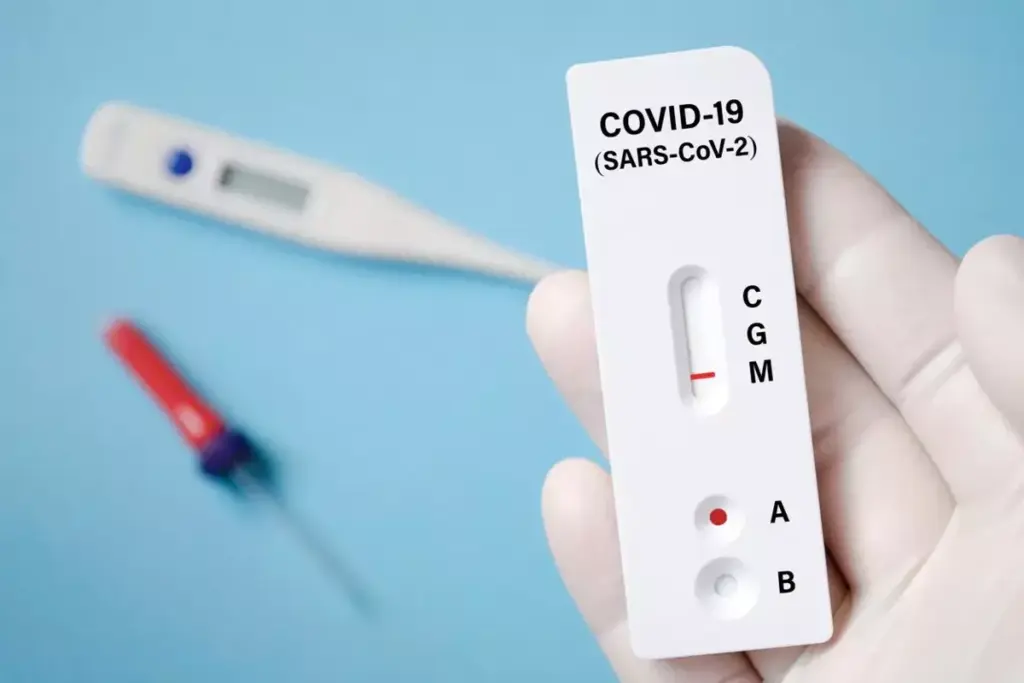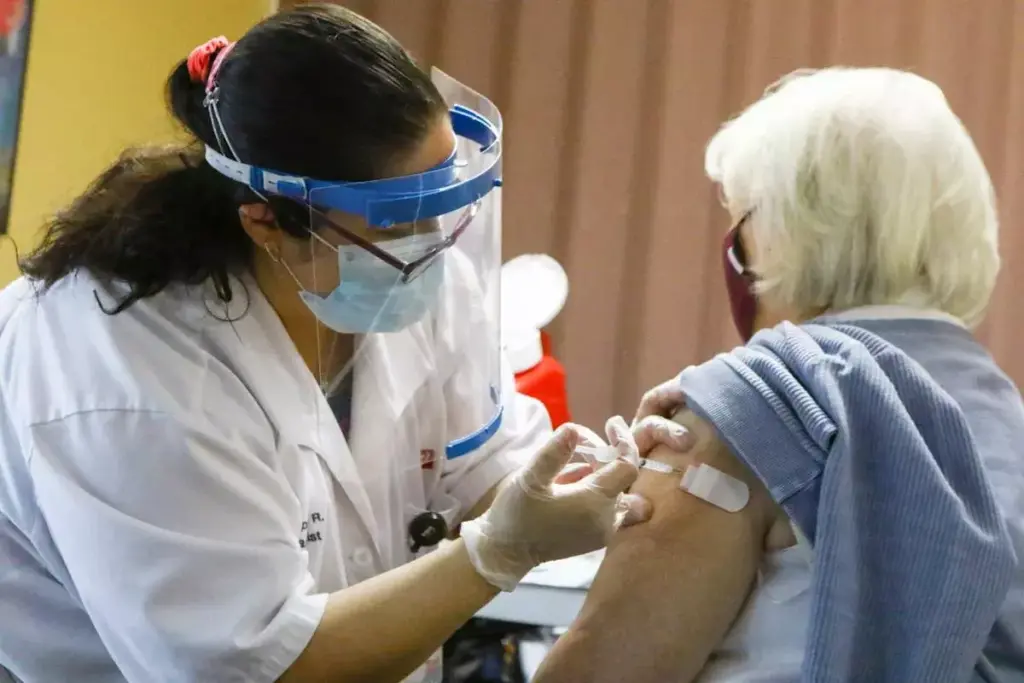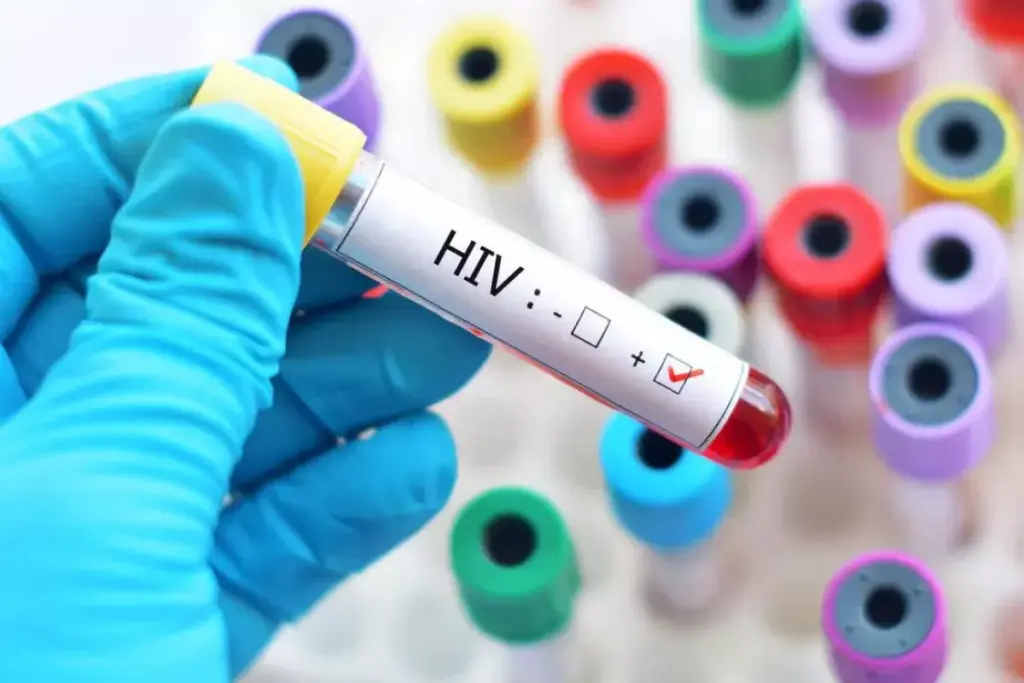Nearly 20% of women with ovarian cancer are first thought to have something else. This is because the symptoms are often unclear and can be mistaken for other illnesses. Many women ask: Would I Feel Sick If I Had Ovarian Cancer?
A woman, a stage 3C ovarian cancer survivor, talked about her journey. She stressed how vital it is to know the warning signs. Her story shows how important it is to notice symptoms like fatigue and nausea, which might mean you have the disease.
It’s key to understand these symptoms to catch the disease early. This article will look at the usual signs of ovarian cancer and why seeing a doctor quickly is so important.

Key Takeaways
- Spotting ovarian cancer symptoms early can lead to better treatment.
- Common signs include ongoing fatigue and nausea.
- Being aware and getting medical help fast is essential.
- The woman’s story shows why knowing ovarian cancer symptoms is vital.
- Early detection can greatly improve survival chances.
Understanding Ovarian Cancer
Ovarian cancer is a serious health issue for women. It has different types and risk factors. It often shows subtle symptoms.
What Is Ovarian Cancer?
Ovarian cancer starts in the ovaries, where eggs are made. It happens when cells grow out of control and form tumors. Ovarian cancer can be very aggressive, so finding it early is key.
Types of Ovarian Cancer
Ovarian cancer comes in several types, based on where it starts. The main types are:
- Epithelial ovarian cancer: This is the most common, making up about 90% of cases. It starts in the outer layer of the ovary.
- Germ cell ovarian cancer: This type starts in the egg-making cells. It’s more common in younger women.
- Stromal ovarian cancer: This rare type starts in the connective tissue of the ovary.
Prevalence and Risk Factors
Ovarian cancer is the fifth leading cause of death in women in the U.S. Some factors increase a woman’s risk. These include:
- Family history: Having a close relative with ovarian cancer.
- Genetic mutations: Having BRCA1 or BRCA2 gene mutations.
- Age: Risk goes up with age, mostly after 50.
Symptoms like ovarian cancer weakness and ovarian cancer loss of appetite can signal the disease. Knowing these symptoms and risk factors is important for early detection and treatment.
Ovarian Cancer Symptoms: An Overview
It’s important to know the symptoms of ovarian cancer to improve survival chances. Ovarian cancer symptoms are often not clear and can be mistaken for other issues. This makes it hard to catch early.
Common Warning Signs
The signs of ovarian cancer can differ, but some common ones are persistent bloating, abdominal pain, and early satiety. She notes that these symptoms can be subtle but keep coming back. This shows why we need to stay alert.
Bloating is a common symptom, often with discomfort or pain in the belly or pelvis. These symptoms can really affect your daily life, causing a lot of discomfort and worry.
| Symptom | Description | Frequency |
| Bloating | Feeling of persistent swelling or tightness in the abdomen | Common |
| Abdominal Pain | Discomfort or pain in the abdominal or pelvic region | Common |
| Early Satiety | Feeling full quickly when eating | Less Common |
Why Symptoms Are Often Misinterpreted
Ovarian cancer symptoms are often mistaken because they can look like other things. Many women and doctors think these symptoms are from IBS, hormonal changes, or stress.
The symptoms of ovarian cancer can look a lot like those of harmless conditions. This can cause delays in getting a diagnosis. It’s key for both people and doctors to watch out for symptoms that don’t go away or get worse.
Knowing the common signs and why they’re often misunderstood can help. It can lead to getting medical help sooner. This could make a big difference in treatment outcomes.
Abdominal and Pelvic Discomfort
Many ovarian cancer patients start noticing symptoms like stomach pain and pelvic pressure. These signs can be hard to spot, often mistaken for other issues. But knowing about these symptoms can help understand the disease better.
Ovarian Cancer Stomach Pain
Ovarian cancer can cause stomach pain that feels like a dull ache or sharp stabbing. This pain doesn’t go away with usual treatments. Survivors say it makes everyday tasks hard.
“I experienced a constant dull ache in my lower abdomen. At first, I thought it was just a side effect of stress, but it persisted for months,” shared an ovarian cancer survivor.
The pain comes from the tumor pressing on organs or fluid buildup in the belly. Knowing the cause helps in managing it.
Pelvic Pressure and Discomfort
Pelvic pressure feels like a heavy or full feeling in the pelvic area. It gets worse with activities that put pressure on the belly, like heavy lifting.
Key characteristics of pelvic pressure in ovarian cancer include:
- Constant or intermittent feeling of pressure
- Sensation of fullness or heaviness
- Discomfort during certain activities
Survivors say this discomfort affects their daily life, making simple tasks hard.
It’s important to know these symptoms for early detection and treatment. If you have ongoing belly or pelvic pain, see a doctor to find out why and what to do next.
Digestive System Changes
Digestive issues are a big worry for those with ovarian cancer. They affect how well they feel overall. Ovarian cancer can cause many changes in the digestive system. These changes can lead to uncomfortable and sometimes very bad symptoms.
Ovarian Cancer Bloating
Bloating is a common symptom of ovarian cancer. It feels like tightness or swelling in the belly. Many patients, like her, have reported feeling bloated a lot.
Constipation and Diarrhea
Changes in bowel habits are also linked to ovarian cancer. Some people get constipation, which means they don’t go to the bathroom often. Others get diarrhea, which is loose, watery stools. Sometimes, people switch between these two problems.
| Symptom | Description | Potential Impact |
| Constipation | Infrequent bowel movements | Discomfort, bloating |
| Diarrhea | Frequent, loose stools | Dehydration, electrolyte imbalance |
Early Satiety and Loss of Appetite
Feeling full quickly after eating and losing appetite are common too. These can lead to not getting enough nutrients and losing weight. This makes things even harder for the patient’s health.
Managing Digestive Symptoms is key to better life quality for ovarian cancer patients. Knowing about these changes and their effects helps in finding ways to lessen them.
Fatigue and General Malaise
Ovarian cancer often brings a deep fatigue that doesn’t get better with rest. It’s not just feeling tired. It’s a deep exhaustion that affects every part of life.
Ovarian Cancer Fatigue
Ovarian cancer fatigue is more than tiredness. It’s a constant exhaustion that makes daily tasks hard. A survivor said, “I felt like I was running on empty all the time, no matter how much I rested.” This fatigue doesn’t go away with rest or sleep, making it a key sign of ovarian cancer.
Weakness and Unexplained Exhaustion
The weakness from ovarian cancer can make simple tasks seem huge. People often feel weak and tired without a clear reason. A survivor shared, “The exhaustion was like nothing I’d ever experienced before. It was as if my body was being drained of all its energy.“
Impact on Daily Activities
Ovarian cancer fatigue greatly affects daily life. Even simple tasks like grocery shopping or cooking can feel overwhelming. Patients often have to change their lifestyle, focusing on rest and pacing themselves. A patient noted, “I had to relearn how to live my life, taking breaks and resting when I needed to, instead of pushing through like I used to.“
It’s important to understand and manage ovarian cancer fatigue to improve life quality. By recognizing the severity of this symptom and seeking support, patients can better cope with ovarian cancer.
Nausea and Vomiting
Ovarian cancer patients often feel nauseous and vomit. These symptoms can really affect their life quality. They can happen because of the cancer or because of treatments like chemotherapy.
Ovarian Cancer Nausea
Nausea from ovarian cancer can be really tough to deal with. It feels like your stomach is uneasy or upset. It can get worse with certain foods or smells. It’s key to manage nausea to feel better overall.
A study on chemotherapy side effects found that nausea and vomiting are common reasons for emergency visits and hospital stays. This shows how important it is to handle these symptoms well.
Vomiting Patterns
Vomiting in ovarian cancer patients can be different for everyone. Some might throw up right after eating, while others might vomit without any food. Knowing these patterns helps in making a good plan to manage them.
Managing Digestive Symptoms
Handling nausea and vomiting in ovarian cancer patients needs a few steps. Eating smaller meals more often and avoiding nausea triggers are good starts. Doctors might also give medicines to help.
Other ways like acupuncture and relaxation can also help. It’s important for patients to work with their healthcare team to find the best way to manage these symptoms.
By using a wide range of methods to manage nausea and vomiting, ovarian cancer patients can live better lives.
Weight Changes and Body Transformations
Ovarian cancer can change the body in many ways, like weight loss and body shape changes. These changes can be upsetting and lower a person’s quality of life.
Unexplained Weight Loss
Many cancers, including ovarian cancer, can cause unexplained weight loss. It’s often one of the first signs something is wrong. For ovarian cancer patients, weight loss can happen for several reasons, like changes in appetite and metabolism. It’s vital for those losing weight without reason to see a healthcare provider to find out why.
Survivors of ovarian cancer often talk about losing weight suddenly, even when they eat the same. This symptom, along with others, made them go to the doctor.
Abdominal Swelling and Distension
Abdominal swelling and distension are big changes seen in ovarian cancer. This swelling can be from fluid buildup (ascites) or tumors. The discomfort and pain from swelling can really affect daily life.
Many survivors say the swelling feels like tightness or pressure in the belly. This symptom can last a long time and get worse if not treated. To manage swelling, doctors often use treatments and suggest lifestyle changes.
It’s key to understand these body changes for early detection and treatment of ovarian cancer. By noticing signs and getting medical help quickly, people can do better and live better.
Urinary and Bladder Issues
Urinary and bladder problems are not well-known symptoms of ovarian cancer. They can greatly affect a patient’s life quality. Symptoms include needing to urinate often, urgency, and changes in bladder habits.
Urinary Urgency and Frequency
Ovarian cancer can cause urinary urgency, a sudden need to urinate, and urinary frequency, needing to urinate more often. These happen because the tumor presses on the bladder and nearby areas. This disrupts normal urine flow.
Patients often feel like they need to urinate all the time, even when they don’t. This can be very upsetting and disrupt daily life. Sometimes, the tumor’s pressure can also cause incontinence, making things even harder.
Changes in Bladder Habits
Changes in bladder habits are another symptom of ovarian cancer. This includes changes in how often you urinate, like needing to go more at night (nocturia). It can also be hard to start urinating.
These changes happen because the tumor presses on the bladder and ureters. In severe cases, this can cause the kidney to swell up because urine can’t drain properly.
Healthcare providers should think about ovarian cancer when patients have these urinary symptoms. This is true if they also have symptoms like bloating or pelvic pain.
Back Pain and Other Discomforts
Understanding back pain in ovarian cancer is key for early detection. Ovarian cancer can cause back pain through tumor growth and metastasis.
Ovarian Cancer Back Pain
Back pain from ovarian cancer can feel different. It might be a dull ache or a sharp pain, often in the lower back. This pain can stay the same or get worse over time.
The pain can happen when the tumor presses on nerves or the spine. Sometimes, the pain spreads to the abdomen or pelvis.
Referred Pain Patterns
Referred pain is when pain feels like it’s coming from somewhere else. In ovarian cancer, this pain can be in the back, abdomen, or thighs. It happens when the tumor irritates nerves or other structures.
- Pain in the back from ovarian cancer can be due to the tumor’s location near the spine or nerves.
- Abdominal pain can also be felt in the back, making it hard to diagnose.
- In some cases, pain is felt in the thighs or groin area, making diagnosis even harder.
Distinguishing from Common Back Pain
Telling if back pain is from ovarian cancer or not can be tough. But, some signs might point to a serious cause.
Key differences include:
- Persistence and Progression: Back pain that keeps coming back or gets worse, with other symptoms like bloating or weight loss.
- Association with Other Symptoms: Having other ovarian cancer symptoms, like abdominal bloating, pelvic pain, or changes in bowel habits, along with back pain.
- Unusual Pain Characteristics: Pain that is severe, sharp, or spreads to other areas, which might mean tumor involvement or metastasis.
If you have back pain with these signs, seeing a healthcare provider is important for a full check-up.
Early vs. Advanced Ovarian Cancer Symptoms
Ovarian cancer symptoms can be hard to spot at first. But catching them early is vital for treatment. Knowing how symptoms change is key to knowing when to see a doctor.
Subtle Early Warning Signs
Early symptoms of ovarian cancer are often vague. They can be mistaken for less serious issues. Common signs include mild bloating, stomach discomfort, and changes in bowel habits. These signs are so subtle, they’re often missed or blamed on other things.
Progressive Symptom Development
As ovarian cancer gets worse, symptoms get stronger. You might feel persistent pelvic pain, trouble eating, and need to pee a lot. How fast these symptoms get worse can vary a lot from person to person. It’s important to watch for any changes.
Red Flag Signs That Shouldn’t Be Ignored
Some symptoms need immediate doctor visits. These include severe abdominal pain, losing a lot of weight, and trouble breathing. Spotting these signs early can really help with treatment.
| Symptom | Early Stage | Advanced Stage |
| Bloating | Mild, occasional | Persistent, severe |
| Pelvic Pain | Intermittent, mild | Constant, severe |
| Urinary Urgency | Occasional | Frequent, urgent |
Knowing the difference between early and advanced symptoms of ovarian cancer is very important. Spotting the early signs and knowing the red flags can help you get medical help quickly. This can improve your chances of getting good treatment.
When to See a Doctor
If you’re feeling symptoms that might be ovarian cancer, it’s important to know when to go to the doctor. Ovarian cancer symptoms can be hard to spot and often seem like other, less serious issues. It’s key to know the signs that mean you should see a doctor.
Persistent Symptoms That Warrant Medical Attention
Some symptoms need you to see a doctor, even if they’re not severe. These include:
- Persistent bloating or swelling in the abdominal area
- Pelvic pain or discomfort that doesn’t go away
- Difficulty eating or feeling full quickly
- Urinary urgency or frequency
- Unexplained weight loss or gain
According to the
“American Cancer Society, women should be aware of these symptoms and discuss them with their doctor if they persist.”
| Symptom | Duration to Seek Medical Attention |
| Bloating or swelling | More than 2 weeks |
| Pelvic pain | More than 1 month |
| Difficulty eating or feeling full | More than 2 weeks |
Preparing for Your Doctor’s Appointment
Before your doctor’s visit, it’s good to prepare by:
- Listing your symptoms, including when they started and how often you experience them
- Noting any changes in your symptoms over time
- Bringing a list of questions to ask your doctor
- Informing your doctor about any family history of cancer
Being ready for your doctor’s appointment can help you get the care you need. Early diagnosis is key to treating ovarian cancer effectively.
Diagnostic Procedures for Ovarian Cancer
Diagnosing ovarian cancer needs several steps. These steps help doctors find out if you have the disease and how far it has spread.
Physical Examinations
A physical exam is often the first step. A doctor checks the pelvic area for any unusual signs. They look for things like an enlarged ovary or other masses.
Imaging Tests
Imaging tests are key to seeing the ovaries and nearby tissues. Some common tests include:
- Ultrasound: Uses sound waves to show images of the ovaries and find tumors or other issues.
- CT Scan: Gives detailed pictures of the abdomen and pelvis, helping to see how big the tumor is and if it has spread.
- MRI: Provides clear images of the pelvic organs, helping to understand how far the cancer has spread.
Blood Tests and Biomarkers
Blood tests check for biomarkers linked to ovarian cancer. The most common one is CA-125. High CA-125 levels might mean ovarian cancer, but other things can cause them too.
Surgical Diagnosis
Often, surgery is needed to confirm ovarian cancer. This might include:
- Laparoscopy: A small surgery that lets doctors look at the ovaries and nearby tissues.
- Laparotomy: A bigger surgery that opens the abdomen to check the ovaries and other organs.
Surgery helps not just in diagnosing but also in figuring out how serious the cancer is. This is key for choosing the right treatment.
Treatment Options and Managing Symptoms
Ovarian cancer treatment has grown a lot, giving patients many ways to manage their condition. Each treatment plan is made just for the person. It considers the cancer’s stage, the patient’s health, and what they prefer.
Surgical Interventions
Surgery is a key treatment for ovarian cancer. The main goal is to remove as much of the tumor as possible. This might include:
- Unilateral or bilateral salpingo-oophorectomy: Taking out one or both ovaries and fallopian tubes.
- Hysterectomy: Removing the uterus, often done with salpingo-oophorectomy.
- Debulking surgery: Removing as much tumor as possible to ease symptoms and help other treatments work better.
Chemotherapy and Radiation
Chemotherapy and radiation therapy are also used to fight ovarian cancer.
Chemotherapy uses drugs to kill cancer cells. It can be given:
- Intravenously: Through a vein, spreading the drugs throughout the body.
- Intraperitoneally: Directly into the abdominal cavity, where the cancer is found.
Radiation therapy uses high-energy rays to kill cancer cells. It helps relieve symptoms or treat cancer that has spread.
Targeted Therapies
Targeted therapies aim to kill cancer cells or stop them from growing. They are less harmful to normal cells. Examples include:
- Bevacizumab (Avastin): A drug that stops new blood vessels from forming, which tumors need to grow.
- PARP inhibitors: Drugs that block an enzyme involved in DNA repair, making it hard for cancer cells to fix themselves.
Symptom Management Strategies
It’s important to manage symptoms to improve life quality for ovarian cancer patients. Ways to do this include:
- Pain management: Using medicines and other methods to control pain.
- Nutritional support: Making sure patients get enough nutrition to stay strong and healthy.
- Emotional support: Providing psychological help through counseling, support groups, or other resources.
Managing ovarian cancer well means using a mix of treatments and symptom management. Knowing about these options helps patients make informed choices about their care.
Prevention and Risk Reduction
Ovarian cancer risk can be lowered by making healthy lifestyle choices and getting medical advice. Some risks can’t be changed, but knowing them and acting early can help. This can lower the chance of getting ovarian cancer.
Lifestyle Factors
Changing your lifestyle can help lower ovarian cancer risk. Here are some ways:
- Maintaining a healthy weight: Being overweight can increase ovarian cancer risk. Eating well and exercising helps keep a healthy weight.
- Exercising regularly: Exercise has been shown to lower ovarian cancer risk.
- Using oral contraceptives: Taking oral contraceptives can lower ovarian cancer risk. The more you use them, the lower the risk.
Genetic Testing and Counseling
Genetic factors can play a big role in ovarian cancer risk for some women. Genetic testing can find mutations in genes like BRCA1 and BRCA2. These are linked to higher risk.
- Identifying genetic mutations: Women with a family history of ovarian or breast cancer might want genetic testing. It can find mutations.
- Counseling and risk management: Genetic counseling helps women understand their risk. It guides them on preventive steps, like surgery.
Regular Health Screenings
There’s no reliable test for ovarian cancer, but regular health checks can help find it early. Talking to a healthcare provider about risk factors can lead to a screening plan tailored for you.
- Annual check-ups: Regular gynecological exams help monitor health and discuss any concerns or symptoms.
- Screening discussions: Women at high risk should talk to their healthcare provider about screening options.
Recognizing Family History Risks
Knowing your family history is key to understanding ovarian cancer risk. A family history of ovarian, breast, or related cancers can raise your risk.
- Documenting family history: Keeping a record of cancers in your family helps understand your risk.
- Discussing with healthcare providers: Sharing family history with healthcare providers can lead to genetic testing or preventive measures.
By making lifestyle changes, being aware of genetic risks, and getting regular health screenings, women can reduce their ovarian cancer risk.
Living with Ovarian Cancer
Living with ovarian cancer is tough. It affects your body and mind. It changes your life, including your relationships and daily activities.
Coping with Physical Symptoms
Managing ovarian cancer symptoms is key. Symptoms like bloating, pain, and bowel changes are common. Effective symptom management needs medical help and lifestyle changes.
Eating right can help with digestion. Choose foods that are easy to digest and full of nutrients. Also, gentle exercises like yoga or short walks can ease pain and boost well-being.
Emotional and Psychological Impact
Ovarian cancer affects your mind too. You might feel anxious, depressed, or scared. Acknowledging these feelings is the first step to healing.
Getting help from mental health experts, support groups, or loved ones is important. Doing things that make you happy, like meditation or hobbies, can also help.
Support Resources and Communities
There are many resources for ovarian cancer patients. Groups like the Ovarian Cancer Research Alliance offer support and information. They also advocate for you.
Online forums and social media groups connect you with others facing similar challenges. Access to these resources can greatly improve your life as an ovarian cancer survivor.
Conclusion
Knowing the symptoms of ovarian cancer is vital for early detection and treatment. We’ve looked at signs like abdominal pain and urinary problems. These can be early warnings.
Being aware of ovarian cancer helps spot these signs early. This means getting medical help quickly. Knowing the risks and symptoms helps people take care of their health.
Staying alert about ovarian cancer can really help with treatment. If symptoms don’t go away, see a doctor right away. This is key to better health outcomes.
By spreading awareness and understanding symptoms, we can help those with ovarian cancer. Together, we can make a difference in their lives.
FAQ
What are the common symptoms of ovarian cancer?
Symptoms include bloating, stomach pain, and feeling full quickly. You might also feel nauseous, tired, or weak. Changes in bowel habits are another sign.
Why are ovarian cancer symptoms often misinterpreted?
Symptoms are often confused with less serious issues like irritable bowel syndrome or menopause. It’s important to know the early signs.
What is the difference between early and advanced ovarian cancer symptoms?
Early symptoms are mild, like bloating or pelvic discomfort. Advanced symptoms are severe, like big belly swelling, losing a lot of weight, and intense pain.
How is ovarian cancer diagnosed?
Doctors use physical exams, imaging tests, blood tests, and surgery to diagnose ovarian cancer. They check for the cancer and its stage.
What are the treatment options for ovarian cancer?
Treatments include surgery, chemotherapy, radiation, and targeted therapies. Each plan is based on the cancer’s stage and the person’s needs.
Can ovarian cancer be prevented or its risk reduced?
While there’s no sure way to prevent it, you can lower your risk. This includes making healthy lifestyle choices, genetic testing, and regular health checks.
How does ovarian cancer affect daily life?
Ovarian cancer and its treatment can make daily tasks hard. Symptoms like fatigue, digestive changes, and pain can affect your quality of life. You’ll need support and ways to manage these issues.
What support resources are available for those living with ovarian cancer?
There are many resources like healthcare providers, support groups, counseling, and online communities. They offer help with emotional, psychological, and practical needs.
When should I seek medical attention for symptoms that could be related to ovarian cancer?
See a doctor if you have symptoms like persistent bloating, pelvic pain, trouble eating, or unexplained weight loss.
How can I prepare for a doctor’s appointment regarding ovarian cancer symptoms?
Write down your symptoms, how long they’ve lasted, and what makes them better or worse. Also, be ready to talk about your medical and family history.










